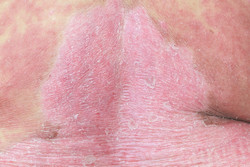Immunological mechanisms of eczema
Atopic dermatitis (AD) or eczema is an immunological disorder resulting from both genetic and environmental factors. Recent research has implicated the primary role of defects in the skin barrier in the development of AD. AD development enables dendritic cells (DCs) to induce the development of type 2 immunity associated with IgE antibodies that recognize environmental antigens entering the skin. Such type 2 T cell-mediated immune responses, including IgE-binding DCs and mast cells (MCs), release pro-inflammatory cytokines and chemokines that cause AD symptoms. The MAST CELLS IN ECZEMA (Study of the role of mast cells in the modulation of immune and inflammatory responses associated with eczema: novel genetic approaches from mouse systems and relevance to the human disease) project looked at the cellular mechanisms involved in eczema. They first developed a house dust mite-induced mouse model of AD, and compared the development of the pathology in wild type and transgenic MC-deficient mice. Results showed that there was no significant difference between the two groups suggesting that, in this model, MCs do not significantly contribute to the disease profile. The team then looked at the role of a protein (RAB guanine nucleotide exchange factor 1, RABGEF1) known to negatively regulate MC activation and mediator production in vitro. Since mice globally deficient in RABGEF1 developed morbidity and severe skin inflammation associated with marked increases in skin MC numbers, the group postulated that overreactive RABGEF1-deficient skin MCs may be responsible for the skin pathology in RABGEF1-deficient mice. The researchers thus deleted RABGEF1 conditionally in MCs and other cell types involved in AD. In contrast to the hypothesis that RABGEF1 deficiency in MCs may play a role in the development of skin lesions in these models, the researchers found that RABGEF1 deficiency in keratinocytes plays a crucial role in promoting the development of skin inflammation in vivo. Applying a translational approach, the researchers also analysed genome-wide expression profiles of human AD skin with and without lesions, which may be used in the continued search for the cellular and molecular events involved in eczema. Ultimately, this research may lead to the discovery of targeted therapies for prevention or treatment of AD. The extensive knowledge platform developed by MAST CELLS IN ECZEMA could also be applied to other atopic diseases such as asthma and rhinoconjunctivitis.







